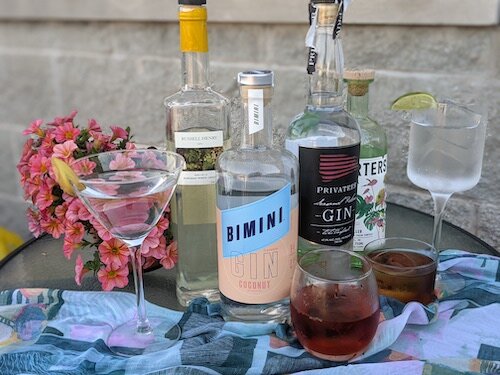Tropical Gins are Better Than Ever: Here Are Some of Our Favorites
Have you noticed that fruity island flavors have been spilling over from fizzy and frivolous drinks into the more staid, traditional gin category? Widely available and quite popular in Europe and Great Britain, spirits like Hoxton Gin with its coconut and grapefruit profile and That Boutique-y Spit-Roasted Pineapple Gin represent an emerging tropical flavor trend, while in the states, Hali’imaile Distilling Company makes their Fid Street Gin on Maui with local pineapples.
Pineapple Gin
We asked Jared Brown, Master Distiller at London’s Sipsmith, about the rise of tropical gins, and he dove deep into the history of pineapple’s popularity in Europe: “Pineapple gin never hit the heights of enduring popularity reached by pineapple rum beginning in the early 1800s, but it was selling from Brooklyn to Savannah, GA, in the late 1840s up to the mid-1850s. I have not seen any references to it in the 1920s (during Prohibition). However, just after Repeal pineapple gin saw a resurgence as part of a flavored gins portfolio from Mr. Boston. There may have been a few other brands available as some advertising from the time only lists “pineapple gin” without mentioning the brand.
The pineapple itself had major cultural significance well before the Victorian Era. From the moment Columbus’ sailors first encountered it and named it ‘piña’ for its resemblance to a pinecone, the pineapple enthralled Europeans and was a symbol of hospitality. By the mid-1600s, Brits returning from the tropics would bring pineapples. Sailors put them on the gateposts of their homes to show the voyage had been successful. Meanwhile, a wealthy home might feature a pineapple as a dining table centerpiece during a week of dinner parties prior to actually cutting up and serving it, as it was such a pricey luxury.
In 1723, the first pineapple was successfully grown in the UK in a hothouse (obviously, this never led to widespread production).”
Top Tropical Gins
We tried several of the excellent tropical gins available in the United States, which range from Tiki-style to intriguing botanical infusions. Here’s our round-up:
Bimini Coconut flavored Gin
Round Turn Distilling - Biddeford ME
Inspired by Hemingway’s gin-drinking escapism and a Death and Co. coconut martini, married Mainers Kristina Hansen and Darren Case use the mixologist’s technique of fat washing to add a rich coconut flavor to their original gin, enhancing the delicate fruits and florals without any suntan lotion taste. Hansen and Case credit their packed column Trident still, which “keeps the proof high and the vapor temperature low during hearts collection, which leaves the heavy juniper notes behind,” for their pleasingly delicate spirit.
Privateer Seasonal Release Tiki Inspired Gin
Ipswich MA
From the highly regarded New England rum distillery, this gin is made from the same molasses-based spirit as their rum, then infused with spices and citrus to add the classic tiki flavors and aromas. Aged for 3 months in stainless steel tanks, this citrus and baking spicy gin is ready to take your gin cocktails to the tropics, whether you are foraying into modern tiki drinks or just taking an island vacation in a glass. Split it with sloe gin in a Singapore sling, or play around with a pineapple negroni.
Russell Henry Hawaiian White Ginger Gin
Tamar Distillery - Redwood Valley CA
Distiller Crispin Cain uses a pot still and an antique cognac still, plus sources ginger from an organic grower on Kauai to make this incredibly gingery gin. The combined process of adding a ginger infusion to his London Dry Gin and then re-distilling preserves the heat one finds in fresh ginger but is elusive to capture, and the result tastes fresh and exciting in cocktails—you may never go back to vodka in your Moscow Mules.
Porter’s Tropical Old Tom Gin
Langstane Liquor Company - Aberdeen, UK
This far from frivolous Scottish gin begins 100% British wheat and classic juniper, then makes a left turn. The spirit is cold distilled in a glass still at about 55°C, layered with distillates of passion fruit, guava and white tea, then lightly sweetened with cane sugar. The result: an elegant spirit without any cloying, cooked, or artificial fruit flavors. Bartender and Langstane Liquor co-founder Alex Lawrence says, “Tropical flavors are enormous in the drinks industry, but they’re often very saccharine, quite juvenile in their profile. Gin being a refined kind of spirit, I thought it would be a great vehicle.” According to Lawrence, a regular martini “becomes a juicy and unctuous apertivo” when crafted with Porter’s Tropical Gin. “You can take quite stuffy cocktails and suddenly they have a subtle kind of fruitiness.”




